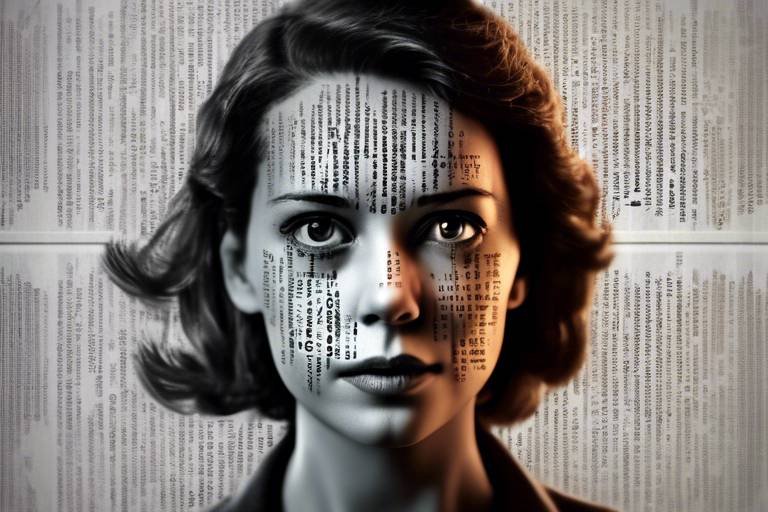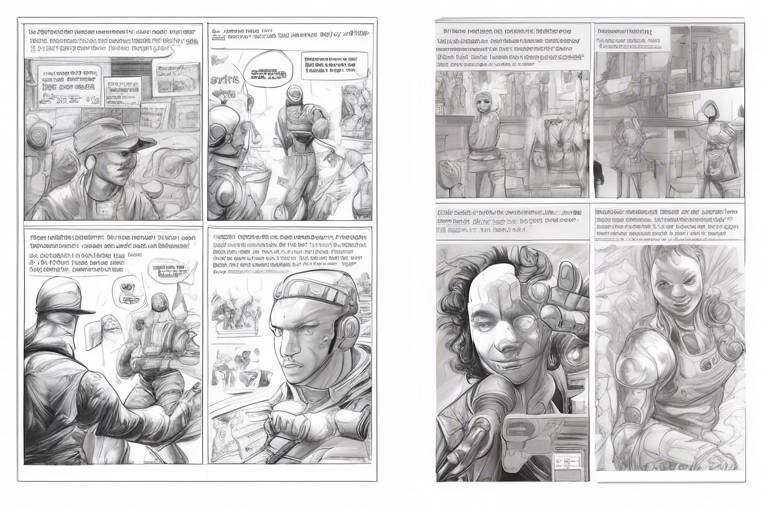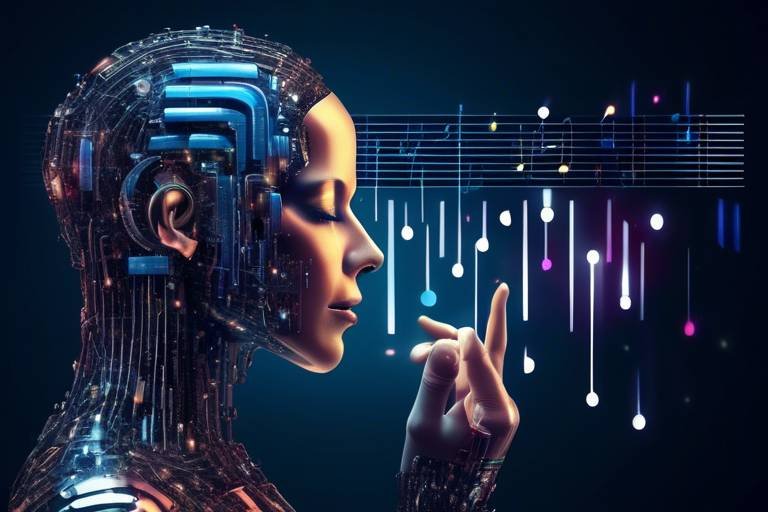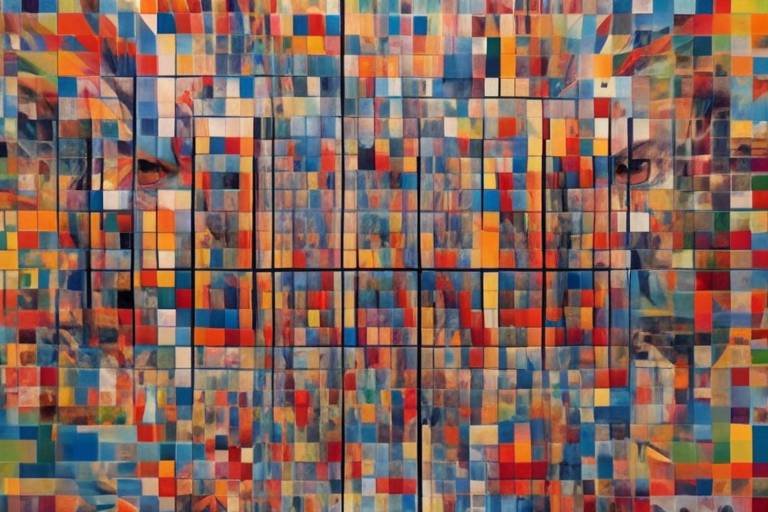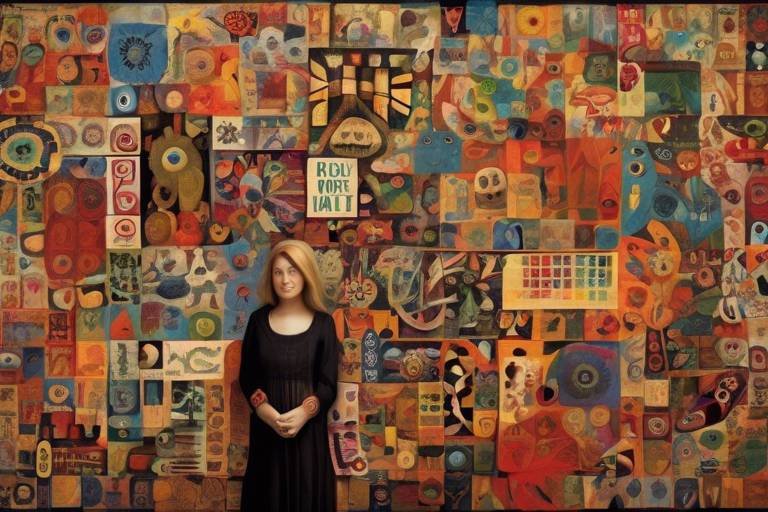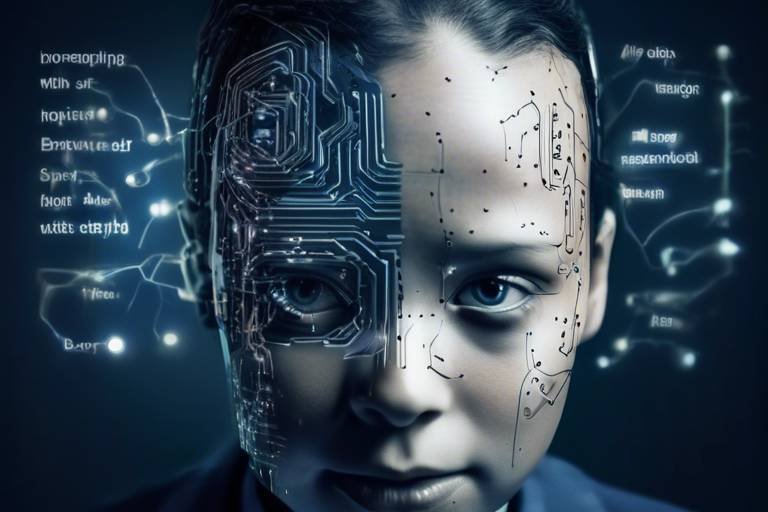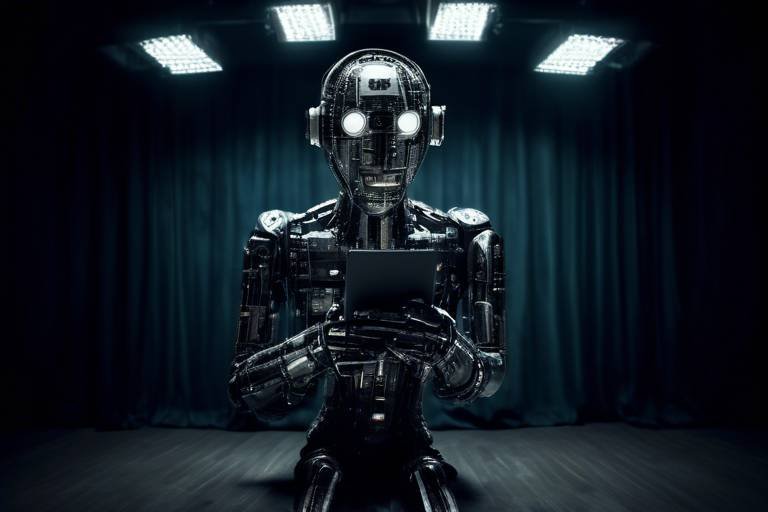AI - The Future of Movie Script Writing
The world of movie script writing is undergoing a remarkable transformation, thanks to the advent of artificial intelligence. Imagine a time when writers could tap into an endless reservoir of creativity, where brainstorming sessions are not just productive but also exhilarating. This is the future that AI promises to filmmakers and writers alike. As we delve into this exciting evolution, we will explore how AI is not just a tool but a partner in the creative process, enhancing the way stories are conceived and told.
The integration of AI into scriptwriting is akin to having a co-pilot in a plane. Just as a co-pilot assists the captain in navigating through turbulent skies, AI helps writers soar above the challenges of creativity block and time constraints. The potential for innovation and efficiency is staggering, allowing writers to focus on what they do best—crafting compelling narratives. With AI's ability to analyze vast amounts of data, writers can gain insights into audience preferences, making their scripts not only unique but also tailored to resonate with viewers.
In this new landscape, AI tools are being developed to assist in various aspects of scriptwriting. From generating plot ideas to suggesting character arcs, these tools are designed to enhance the creative process, offering writers a fresh perspective. Imagine sitting in a café, sipping your favorite drink, while an AI program suggests plot twists that you might never have considered. This collaboration between human creativity and machine intelligence is set to redefine the boundaries of storytelling.
However, as with any technological advancement, there are challenges to consider. The risk of homogenization looms large, with the fear that too much reliance on AI could lead to a lack of originality in scripts. Writers must remain vigilant, ensuring that while they leverage AI's capabilities, they do not lose the emotional depth and nuanced understanding of human experiences that make stories truly impactful. The essence of storytelling is rooted in our shared humanity, and this is something that AI, despite its prowess, cannot replicate.
As we venture further into this uncharted territory, it is essential to engage in ongoing discussions about the ethical implications of AI in scriptwriting. Questions surrounding authorship, originality, and potential biases in AI-generated content must be addressed. The film industry is at a crossroads, and the decisions made today will shape the future of storytelling for generations to come.
In conclusion, the future of movie script writing with AI is not just about efficiency; it’s about enhancing creativity and pushing the boundaries of what is possible. By embracing this technology, writers can unlock new dimensions of storytelling, creating narratives that are not only engaging but also reflective of the diverse experiences of humanity. The journey ahead is exciting, and as we continue to explore the intersection of technology and creativity, one thing is clear: the possibilities are endless.
- How is AI currently being used in scriptwriting? AI is used for generating ideas, developing plots, and analyzing audience preferences to enhance script quality.
- Can AI replace human writers? No, while AI can assist in the writing process, the emotional depth and creativity of human writers are irreplaceable.
- What are the ethical concerns regarding AI in screenwriting? Concerns include authorship, originality, and the potential for bias in AI-generated content.
- Will AI change the way stories are told? Yes, AI has the potential to introduce new storytelling techniques and perspectives, enriching the narrative landscape.

The Rise of AI in Screenwriting
The world of screenwriting is undergoing a remarkable transformation, thanks to the rapid advancement of artificial intelligence (AI). In recent years, AI technologies have become increasingly integrated into the creative processes of filmmakers and writers. Imagine a scenario where a writer, sitting at their desk, has a digital assistant that can generate ideas, develop plots, and even craft dialogue. This isn't just a futuristic dream; it's happening right now! AI is revolutionizing traditional writing methods, enhancing productivity, and opening up new avenues for creativity that were previously unimaginable.
One of the most exciting aspects of AI in screenwriting is its ability to analyze vast amounts of data. By sifting through countless scripts, AI can identify successful patterns and elements that resonate with audiences. This capability allows writers to make informed decisions, ensuring that their stories are not only unique but also appealing to their target demographics. For instance, AI can highlight which genres are currently trending or what themes evoke strong emotional responses from viewers. With these insights, writers can tailor their scripts to meet audience expectations while still maintaining their individual flair.
Imagine having a brainstorming partner that never runs out of ideas! AI tools can facilitate brainstorming sessions by analyzing existing scripts and identifying successful elements. This means writers can explore new ideas and themes that resonate with audiences. Moreover, the integration of AI in screenwriting offers numerous advantages, such as faster turnaround times and improved brainstorming sessions. Writers can focus more on the creative aspects of their work while AI handles the more tedious tasks. It's like having a supercharged writing buddy who can keep pace with your imagination!
However, this rise of AI in screenwriting is not just about efficiency; it's also about enhancing creativity. AI can augment a writer’s creativity by providing unique perspectives, suggesting plot twists, and generating character arcs that writers may not have considered. This collaboration between human intuition and machine learning can lead to more innovative scripts that push the boundaries of storytelling. The synergy between human creativity and AI's analytical prowess creates a dynamic environment where new ideas can flourish.
As we embrace this new era of AI-assisted screenwriting, it's essential to recognize that the human element remains irreplaceable. While AI can assist in generating content, the emotional depth and nuanced understanding of human experiences that writers bring to their scripts are what truly resonate with audiences. The best stories often stem from personal experiences and emotional truths, and these are aspects that AI, despite its capabilities, cannot fully replicate. Therefore, the future of screenwriting lies not in replacing human writers but in enhancing their abilities through collaboration with AI.
In conclusion, the rise of AI in screenwriting is a game-changer that promises to enhance creativity, streamline the writing process, and provide invaluable insights into audience preferences. As writers and filmmakers embrace these tools, they have the opportunity to craft compelling narratives that captivate and inspire. The fusion of technology and storytelling is here to stay, and it opens up a world of possibilities for the future of cinema.

Benefits of AI-Powered Scriptwriting
The integration of AI in scriptwriting is not just a trend; it’s a game-changer that offers a plethora of advantages for writers and filmmakers alike. Imagine being able to churn out ideas and drafts at lightning speed while still maintaining a high level of creativity. With AI tools, this is becoming a reality. They can analyze existing scripts, identify successful formulas, and even suggest improvements, all of which can significantly enhance the writing process. But what exactly are the benefits of using AI in scriptwriting? Let's dive deeper!
One of the most significant advantages is the faster turnaround times. In the fast-paced world of filmmaking, deadlines are often tight. Writers can use AI to generate initial drafts, freeing them up to focus on refining their stories and characters. This means that instead of spending weeks or months on a single draft, writers can produce multiple iterations in a fraction of the time. For instance, AI can help create outlines or even full scenes, which can then be polished to perfection by the writer.
Moreover, AI tools excel at brainstorming. They can sift through vast databases of existing scripts and genres to identify trends and themes that resonate with audiences. This capability allows writers to explore new ideas and narratives that they might not have considered otherwise. Think of it as having a brainstorming partner who has read every script ever written, providing insights and suggestions that are both innovative and relevant.
Another compelling benefit is the ability to analyze audience preferences. AI can examine data from previous films, such as box office performance and viewer ratings, to help writers understand what elements contribute to a successful script. By leveraging this data, writers can craft stories that are more likely to engage their target demographics. For instance, if data shows that audiences favor strong female leads in a particular genre, writers can tailor their scripts to meet this demand, enhancing their chances of success.
Furthermore, the use of AI in scriptwriting can lead to more engaging stories. By utilizing AI to generate unique plot ideas and character arcs, writers can create narratives that stand out in a crowded marketplace. The technology can suggest unexpected twists and turns that keep audiences on the edge of their seats, ultimately leading to a more captivating viewing experience.
In summary, the benefits of AI-powered scriptwriting are vast and varied. From speeding up the writing process to providing valuable insights into audience preferences, AI is proving to be an invaluable tool for modern-day screenwriters. As we continue to embrace these technologies, the potential for creativity and innovation in storytelling is boundless, paving the way for a new era in filmmaking.
- How does AI enhance creativity in scriptwriting?
AI can provide unique perspectives and suggest plot twists that writers may not have considered, leading to more innovative scripts. - Can AI replace human writers?
No, while AI can assist in generating content, the emotional depth and nuanced understanding of human experiences that writers bring to their scripts remain irreplaceable. - What are the ethical considerations of using AI in scriptwriting?
As AI continues to evolve, ethical questions arise regarding authorship, originality, and the potential for bias in AI-generated content.

Enhancing Creativity with AI
In the ever-evolving world of storytelling, creativity is the lifeblood that fuels captivating narratives. With the advent of artificial intelligence, writers now have a powerful ally in enhancing their creative process. Imagine having a brainstorming partner that never tires, constantly offers fresh perspectives, and suggests plot twists that you might not have considered. That’s precisely what AI brings to the table. It acts like a creative muse, providing inspiration that can lead to innovative scripts and unforgettable characters.
AI tools are designed to analyze vast amounts of data, including successful scripts from various genres. This capability allows them to identify patterns and elements that resonate with audiences. For instance, if a writer is struggling to develop a compelling character arc, AI can suggest unique traits, motivations, and conflicts based on trends observed in popular films. This not only saves time but also opens the door to exploring new dimensions of character development.
Moreover, AI can assist in generating plot ideas that are not just unique but also engaging. By tapping into extensive databases of stories and genres, writers can discover unexpected combinations and themes. For example, an AI might suggest blending elements from a classic fairy tale with modern-day dilemmas, creating a narrative that feels both familiar and fresh. This fusion of old and new can lead to scripts that stand out in a crowded market, grabbing the attention of producers and audiences alike.
Here’s how AI enhances creativity:
- Unique Perspectives: AI can analyze diverse narratives and suggest angles that a writer may not have considered, enriching the storytelling experience.
- Plot Twists: By recognizing common tropes and clichés, AI can propose surprising twists that keep the audience guessing.
- Character Development: AI can help create multi-dimensional characters by suggesting backgrounds and conflicts that add depth to the storyline.
In essence, AI is not here to replace writers but to empower them. Think of AI as a creative collaborator that enhances the writer's toolkit. It’s like having a brainstorming session with a team of experts who can provide insights at lightning speed. As writers harness this technology, they can focus more on the emotional and thematic elements of their scripts, while AI handles the heavy lifting of idea generation and analysis.
The future of scriptwriting is bright with the integration of AI. As writers embrace these tools, they will find that their creative boundaries expand, allowing for the exploration of stories that are not only entertaining but also deeply resonant with audiences. With AI by their side, writers can truly unleash their imagination and craft narratives that captivate and inspire.

AI-Assisted Brainstorming Techniques
When it comes to brainstorming, traditional methods often involve sitting in a room with a whiteboard, jotting down ideas as they come. But what if I told you that artificial intelligence is reshaping this creative process? AI-assisted brainstorming techniques are revolutionizing how writers generate ideas, making the experience not only more efficient but also more exciting. Imagine having a virtual assistant that can sift through countless scripts, identify successful elements, and suggest fresh concepts tailored to your project. This is no longer a distant dream; it's happening right now!
One of the most intriguing aspects of AI-assisted brainstorming is its ability to analyze existing content. By examining hundreds or thousands of scripts, AI can pinpoint patterns that resonate with audiences. For example, it can highlight recurring themes, character archetypes, and even dialogue styles that have proven successful in the past. This allows writers to explore new ideas that are not only creative but also grounded in what has worked before. Think of it as having a seasoned mentor who knows the industry inside out, guiding you through the maze of creativity.
Moreover, AI tools can facilitate collaborative brainstorming sessions. Imagine a group of writers gathered around a table, each armed with their own ideas. Now, picture an AI tool that can analyze everyone's contributions in real-time, suggesting combinations and variations that no one had thought of. This collaborative aspect not only enhances creativity but also fosters a sense of camaraderie among writers, as they build on each other's ideas. It’s like having a brainstorming buddy who never runs out of energy or inspiration!
In addition to enhancing the brainstorming process, AI can also generate prompts and questions that stimulate creative thinking. For instance, if you're stuck on a character's motivation, an AI tool might ask, "What if your character faced a moral dilemma that challenges their core beliefs?" Such questions can spark new avenues of thought and push writers beyond their initial concepts.
To illustrate the impact of AI on brainstorming, consider the following table that compares traditional brainstorming methods with AI-assisted techniques:
| Aspect | Traditional Brainstorming | AI-Assisted Brainstorming |
|---|---|---|
| Speed | Can be slow, depending on group dynamics | Rapid idea generation through analysis |
| Data Utilization | Limited to personal experience and knowledge | Access to vast databases of successful scripts |
| Collaboration | Dependent on group interaction | Enhances teamwork with real-time suggestions |
| Creativity | May hit creative blocks | Offers prompts to overcome writer's block |
In conclusion, AI-assisted brainstorming techniques are not just a passing trend; they are paving the way for a new era in scriptwriting. By leveraging the power of artificial intelligence, writers can unlock their creative potential, explore uncharted territories, and ultimately craft more engaging stories. So, why not embrace this technological advancement? After all, the future of storytelling is not just about telling stories—it's about telling them better!
Q: How does AI enhance the brainstorming process?
AI enhances brainstorming by analyzing existing scripts, identifying successful elements, and suggesting fresh ideas that resonate with audiences.
Q: Can AI replace human creativity in scriptwriting?
While AI can assist in generating ideas and providing insights, the emotional depth and nuanced understanding of human experiences that writers bring are irreplaceable.
Q: What are some ethical concerns regarding AI in scriptwriting?
Ethical concerns include questions of authorship, originality, and the potential for bias in AI-generated content, which necessitate ongoing discussions within the industry.

Generating Unique Plot Ideas
In the ever-evolving world of screenwriting, is crucial for standing out in a saturated market. Traditional brainstorming sessions can sometimes lead to repetitive themes and overused tropes, but with the advent of artificial intelligence, writers now have access to a treasure trove of inspiration. Imagine having an assistant that not only understands the intricacies of storytelling but also knows what resonates with audiences. That's the power of AI!
AI tools can sift through vast databases of existing stories, identifying patterns and themes that have captivated audiences in the past. For instance, they can analyze successful films across various genres, extracting key elements that contribute to their popularity. This data-driven approach allows writers to explore new avenues and craft narratives that are not only original but also aligned with current audience preferences. It's like having a personal research assistant who never tires and can process information at lightning speed!
Moreover, AI can suggest plot twists that might not have crossed a writer's mind. By analyzing character development and story arcs from countless scripts, AI can propose unexpected turns that keep viewers on the edge of their seats. This capability can lead to more dynamic storytelling, as writers can incorporate these twists into their narratives, enriching the overall plot. Think of it as having a brainstorming partner who pushes you to think outside the box.
Additionally, AI can help writers develop unique character arcs by suggesting backstories and motivations based on successful character traits from various genres. This not only saves time but also encourages writers to create multi-dimensional characters that resonate with audiences. The result? Stories that feel fresh and engaging, captivating viewers from start to finish.
To illustrate the impact of AI on plot generation, consider the following table that showcases how AI can enhance the writing process:
| AI Capability | Benefit for Writers |
|---|---|
| Data Analysis | Identifies successful themes and elements from previous films. |
| Plot Twist Suggestions | Introduces unexpected developments to keep audiences engaged. |
| Character Development | Provides unique backstories and motivations for characters. |
| Genre Exploration | Encourages experimentation with different genres and styles. |
In conclusion, while the traditional methods of brainstorming and crafting stories will always hold value, the integration of AI in the creative process opens up a world of possibilities. Writers can now generate unique plot ideas with greater efficiency and creativity, ensuring their scripts not only stand out but also resonate deeply with audiences. So, why not embrace this technology and see where it takes your storytelling?
- Can AI completely replace human writers? No, AI is designed to assist and enhance the creative process, not to replace the emotional depth and nuance that human writers bring to storytelling.
- How does AI generate plot ideas? AI analyzes vast amounts of data from existing scripts and films to identify successful patterns and themes, which it then uses to suggest new ideas.
- Are AI-generated scripts original? While AI can suggest unique ideas, the originality of a script ultimately depends on how writers interpret and develop those ideas.
- What are the ethical considerations of using AI in screenwriting? Issues such as authorship, originality, and potential bias in AI-generated content are important discussions that need to be addressed as AI technology evolves.

Data-Driven Script Analysis
This article explores how artificial intelligence is transforming the landscape of movie script writing, enhancing creativity, and streamlining the writing process for filmmakers and writers alike.
AI technologies are increasingly being adopted in screenwriting, allowing writers to generate ideas, develop plots, and create dialogue, thereby revolutionizing traditional writing methods and enhancing productivity.
The integration of AI in scriptwriting offers numerous advantages, including faster turnaround times, improved brainstorming, and the ability to analyze audience preferences for more engaging stories.
AI tools can augment a writer’s creativity by providing unique perspectives, suggesting plot twists, and generating character arcs that writers may not have considered, leading to more innovative scripts.
AI can facilitate brainstorming sessions by analyzing existing scripts and identifying successful elements, allowing writers to explore new ideas and themes that resonate with audiences.
With the help of AI, writers can access vast databases of stories and genres to inspire unique plot ideas, ensuring their scripts stand out in a competitive industry.
In the age of digital storytelling, has emerged as a game-changer for screenwriters. By leveraging vast amounts of data from previous films, AI can identify trends and patterns that contribute to a script's success. Imagine having a virtual assistant that not only understands the nuances of storytelling but also has access to a treasure trove of information about what resonates with audiences. This capability allows writers to craft narratives that are not just creative but are also aligned with audience preferences.
For instance, AI algorithms can analyze box office performance, viewer ratings, and even social media reactions to various films. By examining these elements, writers can gain insights into what themes, characters, and plots are currently popular. This process can be summarized in the following table:
| Data Type | Purpose |
|---|---|
| Box Office Performance | Identifies successful genres and themes. |
| Viewer Ratings | Measures audience satisfaction and engagement. |
| Social Media Reactions | Gauges public sentiment and trending topics. |
Moreover, AI can dissect scripts to highlight which elements contribute to emotional engagement. By utilizing natural language processing, it can evaluate dialogue, pacing, and character development, providing feedback that helps writers refine their scripts. This analytical approach not only enhances the quality of the writing but also helps in making informed decisions about plot adjustments and character arcs.
However, while data-driven insights are invaluable, they should be viewed as a tool rather than a replacement for human creativity. Writers are encouraged to blend these insights with their unique voice and storytelling style, creating a harmonious balance between artistic expression and data-driven strategy.
Despite its benefits, the use of AI in scriptwriting poses challenges, such as the risk of homogenization and the potential loss of the human touch that makes storytelling truly impactful.
While AI can assist in generating content, the emotional depth and nuanced understanding of human experiences that writers bring to their scripts remain irreplaceable, emphasizing the need for collaboration.
As AI continues to evolve, ethical questions arise regarding authorship, originality, and the potential for bias in AI-generated content, necessitating ongoing discussions in the industry.
- Can AI completely replace human screenwriters?
No, while AI can assist in generating ideas and analyzing data, the emotional depth and creativity of human writers are irreplaceable. - How does AI analyze scripts?
AI uses algorithms to evaluate various elements of scripts, such as dialogue, pacing, and character development, comparing them against successful films. - What are the ethical concerns surrounding AI in screenwriting?
Concerns include issues of authorship, originality, and potential biases in AI-generated content.

Challenges and Limitations of AI in Screenwriting
While the integration of artificial intelligence in screenwriting brings a plethora of benefits, it also presents several challenges and limitations that cannot be overlooked. One of the most pressing concerns is the risk of homogenization. As AI systems are trained on existing scripts and patterns, there is a potential for them to generate content that feels formulaic and lacks originality. Imagine a world where every movie follows the same predictable plot structure because AI has analyzed what has worked before. This could lead to a cinematic landscape that is dull and uninspired, much like a factory producing identical products instead of unique works of art.
Furthermore, the human touch in storytelling is irreplaceable. Writers infuse their scripts with emotional depth and a nuanced understanding of human experiences that AI simply cannot replicate. For instance, consider how a seasoned writer draws from personal experiences or cultural backgrounds to create relatable characters and compelling narratives. AI, on the other hand, lacks this personal connection and emotional intelligence, which can result in scripts that feel flat or disconnected from the audience.
Another significant challenge lies in the ethical considerations surrounding AI-generated content. As AI technologies continue to evolve, questions about authorship and originality become increasingly important. Who owns the rights to a script generated by AI? Is it the programmer, the user, or the AI itself? These questions raise complicated legal and ethical dilemmas that the industry must address. Moreover, there is a risk of bias in AI-generated scripts. If the training data used to develop these AI systems reflects societal biases, the scripts they produce may inadvertently perpetuate stereotypes or exclude diverse perspectives.
To illustrate these challenges, consider the following table that summarizes key limitations of AI in screenwriting:
| Challenge | Description |
|---|---|
| Homogenization | The risk of producing formulaic content that lacks originality. |
| Loss of Human Touch | AI cannot replicate the emotional depth and personal experiences of human writers. |
| Ethical Concerns | Questions of authorship and potential biases in AI-generated content. |
In conclusion, while AI has the potential to enhance the screenwriting process significantly, it is crucial to recognize and address these challenges. The future of scriptwriting may very well depend on a harmonious collaboration between human writers and AI technologies, where the strengths of both can be leveraged to create compelling, original stories that resonate with audiences.
- Can AI completely replace human screenwriters? No, AI can assist in the writing process but cannot replicate the emotional depth and creativity of human writers.
- What are the ethical implications of AI in screenwriting? Ethical questions arise regarding authorship, originality, and potential biases in AI-generated content.
- How can writers utilize AI effectively? Writers can use AI as a brainstorming tool to enhance their creativity and generate unique plot ideas while maintaining their unique voice.

The Human Element in Storytelling
When we think about storytelling, it's easy to get swept up in the glittering allure of technology. After all, artificial intelligence can churn out ideas faster than a writer can say “blockbuster.” But let's take a moment to pause and ponder: what truly makes a story resonate with us? It's not just the plot twists or the snappy dialogue; it's the human element that breathes life into the narrative. Imagine a gripping drama or a heartwarming comedy—what ties those stories together is the emotional depth and relatable experiences that only a human can provide.
AI can generate scripts, suggest plot lines, and even create characters, but it lacks the ability to infuse those characters with the complex emotions that make us feel connected. Think about your favorite movie. What do you remember most? Is it the special effects or the way the characters made you feel? The laughter, tears, and everything in between are what linger in our minds long after the credits roll. This is where the human touch is irreplaceable. Writers tap into their own experiences, emotions, and observations of the world around them to craft stories that speak to the heart.
Moreover, storytelling is not just about relaying events; it’s about creating an experience. When a writer draws from their own life, they can weave in nuances that AI simply cannot replicate. For example, the way a character reacts to loss or joy is often shaped by the writer’s understanding of those emotions. This understanding is cultivated through personal experiences, relationships, and cultural contexts. AI may analyze data and trends, but it can’t live through the highs and lows of human existence.
As we embrace AI in scriptwriting, it’s crucial to recognize the importance of collaboration between technology and human creativity. Writers can use AI as a tool to enhance their storytelling process, but they must also ensure that their unique voice and perspective shine through. The best scripts often come from a blend of innovative technology and the rich tapestry of human experience. In this way, AI can serve as a creative partner, helping writers refine their ideas while still allowing the emotional core of the story to remain intact.
In conclusion, while AI is making waves in the world of screenwriting, it’s the human element that truly captivates audiences. As we move forward into this new era of storytelling, let’s not forget the power of our shared experiences and the emotional depth that only we can provide. After all, at the heart of every great story lies the undeniable truth that we are all human, and it’s our stories that connect us.
- Can AI replace human screenwriters?
No, while AI can assist in generating ideas and scripts, it cannot replicate the emotional depth and human experiences that writers bring to their stories.
- What are the benefits of using AI in scriptwriting?
AI can help speed up the writing process, provide unique plot ideas, and analyze audience preferences, enhancing creativity and productivity.
- How can writers collaborate with AI?
Writers can use AI tools to brainstorm, refine their ideas, and explore new themes while ensuring their unique voice remains central to the story.
- What ethical considerations arise with AI-generated scripts?
Concerns include authorship, originality, and potential biases in AI content, which necessitate ongoing discussions in the industry.

Ethical Considerations in AI-Generated Scripts
As artificial intelligence continues to make strides in the realm of scriptwriting, it brings with it a plethora of ethical considerations that cannot be overlooked. One of the foremost issues is the question of authorship. When an AI generates a script, who is the true author? Is it the programmer who developed the AI, the writer who utilized the tool, or the AI itself? This ambiguity raises profound questions about intellectual property rights and the ownership of creative works.
Moreover, there is the potential for bias in AI-generated content. AI systems learn from existing datasets, which means they can inadvertently perpetuate stereotypes or exclude diverse voices if not carefully monitored. For instance, if an AI is trained predominantly on scripts from a specific genre or demographic, it may struggle to create narratives that resonate with broader audiences. This could lead to a homogenization of stories, where unique cultural perspectives are sidelined in favor of more mainstream narratives.
Another pressing concern is the impact on employment within the creative industry. As AI tools become more sophisticated, there is a legitimate fear that they could replace human writers altogether. While AI can assist in generating ideas or polishing drafts, the essence of storytelling—the emotional resonance and the ability to connect with audiences—remains a distinctly human trait. Thus, it is crucial for writers and filmmakers to view AI as a collaborative partner rather than a replacement.
To further illustrate these ethical considerations, let’s look at some key points:
- Authorship and Ownership: Who holds the rights to AI-generated scripts?
- Bias and Representation: How can we ensure AI reflects diverse voices and stories?
- Employment Impact: Will AI tools lead to job losses in the creative sector?
- Quality vs. Quantity: Can we maintain the quality of storytelling with AI's efficiency?
In navigating these complex issues, the film industry must engage in ongoing discussions about the role of AI in creative processes. This includes establishing guidelines for the ethical use of AI in scriptwriting, ensuring that human writers remain at the forefront of storytelling, and actively working to mitigate biases in AI algorithms. The goal should be to harness the power of AI while preserving the human touch that makes storytelling a deeply personal and impactful experience.
1. Can AI fully replace human scriptwriters?
While AI can assist in generating ideas and refining scripts, the emotional depth and unique perspectives that human writers bring to storytelling cannot be replicated by AI.
2. How can we ensure that AI-generated content is free from bias?
To minimize bias, it is essential to train AI on diverse datasets and continuously monitor its outputs for fairness and representation.
3. Who owns the rights to a script generated by AI?
The question of ownership is complex and varies by jurisdiction. Generally, it may depend on the agreements made between the programmer, the user, and the AI itself.
4. What are the benefits of using AI in scriptwriting?
AI can enhance productivity, suggest innovative ideas, and analyze audience preferences, making the scriptwriting process more efficient.
5. Are there ethical guidelines for using AI in creative industries?
Currently, ethical guidelines are still being developed, but they will likely focus on issues of authorship, bias, and the impact on employment within the creative sector.
Frequently Asked Questions
- How is AI changing the landscape of movie script writing?
AI is revolutionizing movie script writing by allowing writers to generate ideas, develop plots, and create dialogue much faster than traditional methods. It enhances creativity and streamlines the writing process, making it easier for filmmakers to bring their visions to life.
- What are the main benefits of using AI in scriptwriting?
The integration of AI in scriptwriting offers several advantages, such as quicker turnaround times, improved brainstorming capabilities, and the ability to analyze audience preferences. This helps writers craft more engaging and relevant stories that resonate with viewers.
- Can AI really enhance a writer's creativity?
Absolutely! AI tools can provide unique perspectives and suggest plot twists or character arcs that a writer might not have considered. This collaboration can lead to more innovative and compelling scripts, pushing the boundaries of traditional storytelling.
- What techniques does AI use for brainstorming?
AI can analyze existing scripts to identify successful elements and themes. By doing so, it helps writers explore new ideas and directions, making brainstorming sessions more productive and inspiring.
- How does AI assist in generating unique plot ideas?
AI has access to vast databases of stories and genres, allowing it to inspire writers with unique plot ideas. This ensures that scripts stand out in a competitive industry, helping filmmakers capture the audience's attention.
- What role does data play in AI-driven script analysis?
Data plays a crucial role in AI-driven script analysis. By examining data from previous films, AI can help writers understand what elements contribute to a successful script, guiding them in creating stories that appeal to specific demographics.
- What challenges does AI face in screenwriting?
Despite its benefits, AI in scriptwriting faces challenges such as the risk of homogenization and the potential loss of the human touch in storytelling. These factors could impact the emotional depth and connection that audiences seek in films.
- Why is the human element important in storytelling?
The human element is irreplaceable in storytelling because it brings emotional depth and a nuanced understanding of human experiences. While AI can assist in generating content, the unique insights and feelings that writers provide are essential for impactful storytelling.
- What ethical considerations arise with AI-generated scripts?
As AI technology evolves, ethical questions regarding authorship, originality, and potential bias in AI-generated content become increasingly important. Ongoing discussions in the industry are necessary to address these concerns and ensure responsible use of AI in scriptwriting.

